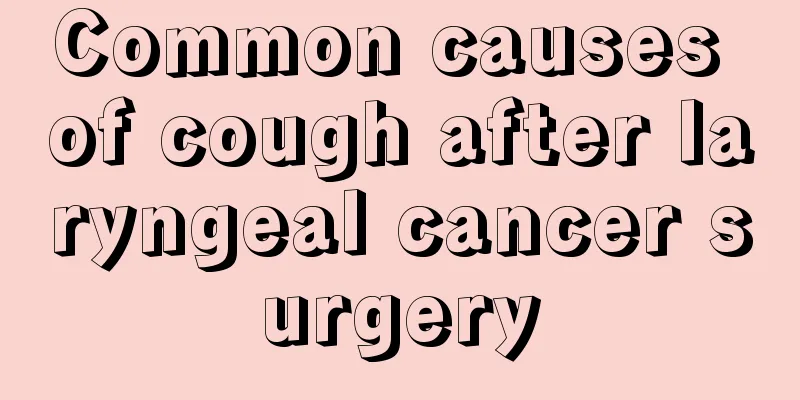Common causes of cough after laryngeal cancer surgery

|
Patients with laryngeal cancer may also experience a series of complications after surgery to remove the tumor. Coughing is one of the common symptoms. Frequent coughing is not conducive to wound healing and can also disturb the patient's mood. There are three main factors that cause patients to cough frequently after surgery. 1. Respiratory secretion factors Tracheotomy and fistula after laryngeal cancer surgery changes the integrity of the normal respiratory tract, the function of the respiratory mucociliary membrane changes, and the secretions increase. In the early postoperative period, patients are afraid to forcefully sputum due to wound pain and other factors. Sputum accumulates and forms scabs, which irritates the tracheal wall and causes coughing. Obvious sputum sounds or noises inside the cannula can also be heard. 2. Tracheal tube factors After tracheotomy, patients often feel uncomfortable when wearing the cannula for the first time, which causes some irritation to the trachea and causes irritating dry cough. Some cases are caused by the cannula being too large or too curved, causing the distal end of the cannula to collide with the anterior wall of the trachea, which causes coughing. The main manifestations are induced or postural coughs, often accompanied by blood in sputum. Severe coughs can sometimes be relieved by replacing the appropriate cannula or adjusting the tightness of the cannula tie. 3. Mucosal incision suture During vertical hemi-laryngectomy and middle laryngectomy, due to surgical interference, mucosal edema, inflammatory reaction, etc., the mucosal sense reaction is slow, saliva swallowing is difficult, and it is easy to cause aspiration, and choking and coughing are inevitable. In more obvious cases, there is an itchy feeling in the throat and a foreign body sensation. Mucosal trauma and absorption of thread head stimulation can also cause patients to cough violently. In this case, patients should try not to cough vigorously to avoid affecting wound healing. They should follow the doctor's advice to use appropriate antitussive drugs to control coughing. |
<<: 3 kinds of TCM special treatments for lymphoma
>>: Several foods suitable for pancreatic cancer patients to eat
Recommend
What are the advantages and disadvantages of winter swimming
Modern people are paying more and more attention ...
Be careful of these 9 kinds of sudden pain that may kill you
Introduction: Have you ever experienced sudden pa...
What to do if you have nasal congestion due to nasopharyngeal cancer? What should you pay attention to in your diet?
What to do if you have nasal congestion due to na...
What diseases can Wang Buhe cure
Wang Buhe is the inheritor of a national intangib...
Only when we know the cause of cervical cancer can we prevent the disease
Cervical cancer has long been a disease that has ...
Why does saliva stink? Here are the reasons
Everyone wants their breath to be fresh and give ...
Recurrence rate of body odor removal
In the summer, the temperature is good and the we...
Tips to relieve buttocks from long-term sitting
White-collar women who sit in the office and work...
What are the mid-stage symptoms of colorectal cancer
Rectal cancer should be treated in time. If the s...
Symptoms of colon inflammation_Symptoms of colitis
The intestines are a place that is prone to infec...
How to treat herpes disease
Congenital herpes can be treated with some antivi...
What should I do if my stomach feels cold?
A cold stomach is not a disease, it is mainly bec...
What are the principles of tampons
Sanitary tampons are a kind of built-in menstrual...
Do you have any symptoms of heart qi deficiency?
The heart is a very important organ in the human ...
What should I do if red granulations grow on the edge of my tongue
Many parts of the human body may become inflamed,...









